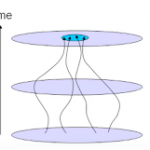 One of the most intriguing aspects of the current U.S. border crisis is the way that human rights and American decency get articulated in the public sphere of discourse. An initial pull is raw emotion and empathy, then there are counterweights where the long-term consequences of existing policies are weighed against the exigent effects of the policy, and then there are crackpot theories of “crisis actors” and whatnot as bizarro-world distractions. But, if we accept the general thesis of our enlightenment values carrying us ever forward into increasing rights for all, reduced violence and war, and the closing of the curtain on the long human history of despair, poverty, and hunger, we must also ask more generally how this comes to be. Steven Pinker certainly has rounded up some social theories, but what kind of meta-ethics might be at work that seems to push human civilization towards these positive outcomes?
One of the most intriguing aspects of the current U.S. border crisis is the way that human rights and American decency get articulated in the public sphere of discourse. An initial pull is raw emotion and empathy, then there are counterweights where the long-term consequences of existing policies are weighed against the exigent effects of the policy, and then there are crackpot theories of “crisis actors” and whatnot as bizarro-world distractions. But, if we accept the general thesis of our enlightenment values carrying us ever forward into increasing rights for all, reduced violence and war, and the closing of the curtain on the long human history of despair, poverty, and hunger, we must also ask more generally how this comes to be. Steven Pinker certainly has rounded up some social theories, but what kind of meta-ethics might be at work that seems to push human civilization towards these positive outcomes?
Per the last post, I take the position that we can potentially formulate meaningful sentences about what “ought” to be done, and that those meaningful sentences are, in fact, meaningful precisely because they are grounded in the semantics we derive from real world interactions. How does this work? Well, we can invoke the so-called Cornell Realists argument that the semantics of a word like “ought” is not as flexible as Moore’s Open Question argument suggests. Indeed, if we instead look at the natural world and the theories that we have built up about it (generally “scientific theories” but, also, perhaps “folk scientific ideas” or “developing scientific theories”), certain concepts take on the character of being so-called “joints of reality.” That is, they are less changeable than other concepts and become referential magnets that have an elite status among the concepts we use for the world.… Read the rest







